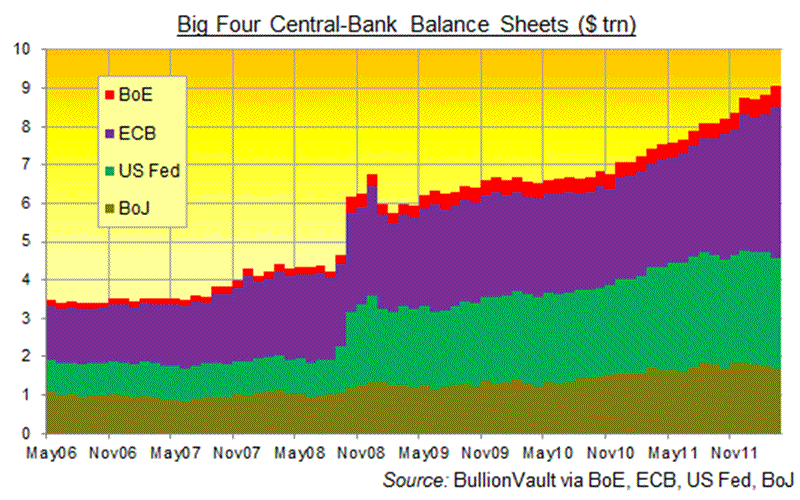Central Banks at the End of the Pier Show
Interest-Rates / Credit Crisis 2012 Apr 28, 2012 - 01:50 AM GMTBy: Adrian_Ash
 — Tell me now, Stephen said, poking the boy's shoulder with the book, what is a pier.
— Tell me now, Stephen said, poking the boy's shoulder with the book, what is a pier.
— A pier, sir, Armstrong said. A thing out in the waves. A kind of bridge. Kingstown pier, sir [...]
— Kingstown pier, Stephen said. Yes, a disappointed bridge.
James Joyce, Ulysses (Paris, 1922)
FIVE YEARS into the global financial crisis so far, and where did zero rates and $5 trillion of money creation get us?
To the end of the pier, it seems.

"Having built a bridge for other policymakers and for healthy balance sheets in the private sector," said Mohamed El-Erian, CEO of bond-fund giant Pimco this month, "central banks must now hope that a more timely, comprehensive and effective response will finally be forthcoming (and push for it, as appropriate)."
Push for a fix, they certainly do. All the developed-world's top central-bank chiefs have long said the can't fix the world with more money alone. Now they've started pointing to government, asking for fiscal policymakers to take on the task instead. And they really have tried. The Federal Reserve has grown its balance-sheet – creating money to buy Treasury bonds and extend easy loans to the banks – at a 19% annual clip since the summer of 2007. Here in Europe, the European Central Bank and Bank of England have each swollen by more than 22% per year!
Now, this week, ECB president Draghi called for a "growth compact" from Eurozone governments to go with his flood of cheap money. Even US Fed chairman Ben Bernanke said that he's been "extraordinarily accommodative", and really, he'd rather not keep printing in the vain hope of juicing a marginal, uncertain boost to the economy.
Bernanke's own record might make that statement sound doubtful. But anyone who says Paul Krugman is wrong – or even just hints it – can't be all bad. And after kicking the can as far down the road as they could, central bank chiefs really do seem hopeful that the fiscal authorities will run into the box to collect their pass, ready to shoot – and score! – between the jumpers for goalposts.
Because "should [a government fix] fail to materialize," El Erian already said way back in January, "central banks risk finding themselves having built expensive bridges to nowhere."
That phrase – "bridges to nowhere" – is most often used to mock Japan's huge government spending of the mid- to late-1990s, when it first struggled and failed to shake off its own post-bubble debt deflation. Concrete was poured nationwide, with roads and bridges quite literally built to take no one to nowhere, other than keeping construction workers out of the welfare line.
The fix which El-Erian and central banks everywhere now hope for might not in fact work, in short. But either way, it hasn't yet materialized in the West, where "austerity" (or what passes for it a century into the welfare state's relentless growth) is only now facing a solid political block.
Pending that "fix" – of more debt on more bridges to nowhere, further out into the waves – "[Central banks] will come under severe pressure," as El Erian warned at the start of this year, "with implications for the future of central banking itself, as well as for the welfare of economies at the national, regional and global."
Couldn't put it better ourselves. So we won't try.
By Adrian Ash
BullionVault.com
Gold price chart, no delay | Buy gold online at live prices
Formerly City correspondent for The Daily Reckoning in London and a regular contributor to MoneyWeek magazine, Adrian Ash is the editor of Gold News and head of research at www.BullionVault.com , giving you direct access to investment gold, vaulted in Zurich , on $3 spreads and 0.8% dealing fees.
(c) BullionVault 2012
Please Note: This article is to inform your thinking, not lead it. Only you can decide the best place for your money, and any decision you make will put your money at risk. Information or data included here may have already been overtaken by events – and must be verified elsewhere – should you choose to act on it.
© 2005-2022 http://www.MarketOracle.co.uk - The Market Oracle is a FREE Daily Financial Markets Analysis & Forecasting online publication.



